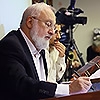 Question: What is special about the Ari’s methodology compared to the Kabbalists who came before him?
Question: What is special about the Ari’s methodology compared to the Kabbalists who came before him?
Answer: Systematization. Nothing new. No subsequent Kabbalist can add anything to the work of the previous Kabbalists other than to further elaborate on the conclusions made in their discoveries and to give a greater systematic description of what may have been described with just a few phrases. That is all.
Question: Can it be said that the language also changed?
Answer: Of course. For example, if we take a physics course written 200 years ago and compare it with a current textbook, naturally there will be a difference between them. But, in principle, the essence of the information contained within them remains the same.
That is why great Kabbalists—pillars appearing once in several generations—significantly added to previous discoveries.
Question: Did the means of attaining those discoveries remain the same?
Answer: Yes, because the structure of the upper world does not change.
There are two forces in existence: the force of bestowal and the force of reception. The interaction between these two forces forms the upper system and controls our world through it. This is pure physics—a simple mechanism of control of our world.
That is why Kabbalists cannot reveal anything new, but can only explain in greater detail what was previously disclosed. After all, that which was attained by Abraham, Moses, and the Kabbalists of the First and Second Temples continues to act and to be discovered today.
There is nothing new in the upper world. It is a stable, constant system. It is just that the Kabbalists, through their attainment, add clarification for the next generation so that it may be easier to understand. In this way, in each generation the language of the explanations changes in order to make it more comprehensible for that generation. That is why Baal HaSulam (in the early 20th century) and Rabash (late 20th century) are our closest Kabbalists.
[217019]
From the Kabbalah Lesson in Russian, 7/23/17
[217019]
From the Kabbalah Lesson in Russian, 7/23/17

No comments:
Post a Comment